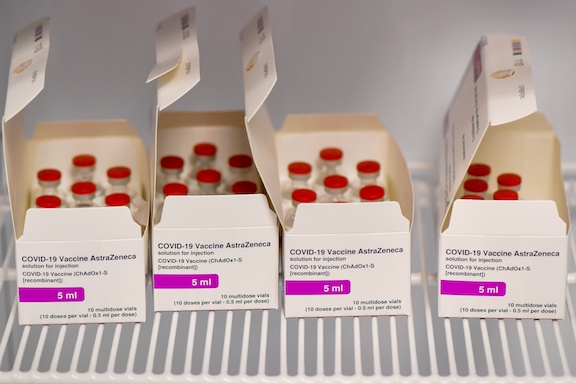EU demands access to AstraZeneca’s U.K. vaccine supplies in call
A chaotic showdown between AstraZeneca Plc and the European Union is coming to a head in a high stakes meeting on Wednesday with EU officials demanding the company tap British production facilities to make up for shortfalls in supply to the continent.

The public fight has epitomized the bloc’s failure to put its mass vaccination campaign on the right track, and cast doubt on its hopes to inoculate millions speedily and exit recession-inducing lockdowns. The row was triggered by the drugmaker’s announcement that vaccine deliveries to Europe will be lower than previously anticipated.
The EU wants to extract clear commitments from Astra on how many life-saving shots will be made available to the bloc during the first half of the year.
The demand follows a public war of words between the two sides, including threats of lawsuits, export curbs, and accusations of lying over legally binding contracts. Earlier on Wednesday, the dispute turned farcical, with the EU saying Astra had pulled out of the scheduled call, in what would be an unprecedented snub of 27 governments. The drugmaker denied that account, and the EU then said the meeting was back on.
EU countries are desperate to speed up vaccinations after a sluggish start that’s left the bloc lagging far behind the U.S. and the U.K. The EU has administered just 2.2 doses per 100 people, versus 7.5 doses in the U.S., 11 doses in the U.K. and almost 45 doses in Israel. Astra’s vaccine isn’t due to be authorized for use in the bloc until Friday at the earliest.
With intense pressure on governments, dramatic proposals have been raised, including restrictions on vaccine exports out of the EU. On Wednesday, German Economy Minister Peter Altmaier indicated that such an option is still possible, noting that there were EU-wide export limits on certain kinds of protective medical equipment last year.
“Our main priority must be to make enough vaccine available for very many countries, also for Germany, at the latest from the second half of the year,” he said. “We are examining all available possibilities that conform with European and German law.”
Astra shares fell as much as 2.8%, the most since Dec. 14.
The issue has been rumbling since late last week, when Astra warned of delays at a production plant in Belgium. With governments attacking the company, its chief executive pushed back on Tuesday. Pascal Soriot used an interview with European newspapers to deflect blame, saying the company has a so-called best-effort agreement that doesn’t specify a quantity. That’s because the EU insisted on receiving the AstraZeneca vaccine about the same time as the U.K. despite putting in its order three months later.
A key part of the disagreement is the use of vaccines produced in U.K. factories. The EU disputes that the U.K. has priority on vaccines from British plants, and wants Astra to agree to release the deal Brussels signed with the company.
”We reject the logic of first come, first served,” EU Health chief Stella Kyriakides told reporters in Brussels ahead of the call. “That may work at the neighbourhood butchers, but not in contracts.”
In the interview, Soriot suggested he understands that the situation is difficult for leaders across Europe, where Brussels has coordinated a vaccine-buying program.
“Everybody is getting kind of a bit, you know, aggravated or emotional about those things.” he said in the comments published in La Repubblica and other newspapers. “But I understand because the commission is managing the process for the whole of Europe.”
Soriot also said that once Astra gets EU regulatory approval it will ship at least 3 million doses immediately, with a target of 17 million by February. That should help Europe accelerate vaccinations and get economies closer to exiting damaging lockdowns that have crippled industries and caused growing discontent.
In an effort to alleviate shortages, French drugmaker Sanofi said it agreed to help produce more than 125 million doses of the shot Pfizer Inc. developed with Germany’s BioNTech SE. That shot, and one by Moderna Inc., are already authorized for use.
Sanofi will provide BioNTech access to its production sites in Frankfurt starting this summer, it said in a statement Wednesday. The goal is to accelerate efforts to package and distribute the vaccine, which needs to be kept at ultra-cold temperatures.
Similar Stories

December 2024 U.S. Transportation Sector Unemployment (4.3%) Was the Same As the December 2023 Level (4.3%) And Above the Pre-Pandemic December 2019 Level (2.8%)
View ArticleDP World appoints Jason Haith as Vice President of Freight Forwarding for U.S. and Mexico
DP World, a global leader in logistics and supply chain solutions, has announced the appointment of Jason Haith as Vice President, Commercial Freight Forwarding – U.S. and Mexico, effective immediately.…
View Article
Amaero secures final approval for $23.5M loan from Export-Import Bank
View ArticleU.S. Bureau of Labor Statistics employment situation
Total nonfarm payroll employment increased by 256,000 in December, and the unemployment rate changed little at 4.1 percent, the U.S. Bureau of Labor Statistics reported today. Employment trended up in…
View ArticleImport Cargo to remain elevated in January
A potential strike at East Coast and Gulf Coast ports has been avoided with the announcement of a tentative labor agreement, but the nation’s major container ports have already seen…
View ArticleS&P Global: 2025 U.S. transportation infrastructure sector should see generally steady demand and growth
S&P Global Ratings today said it expects activity in the U.S. transportation sector will continue to normalize in 2025, with growth rates for most modes of transportation slowing to levels…
View ArticleGet the most up-to-date trending news!
SubscribeIndustry updates and weekly newsletter direct to your inbox!





